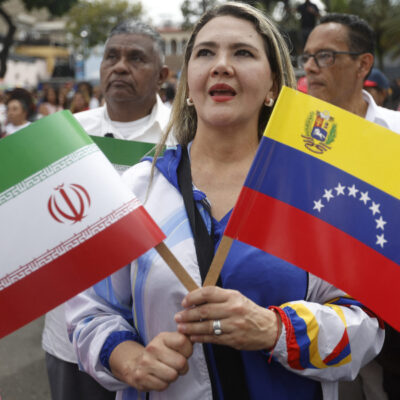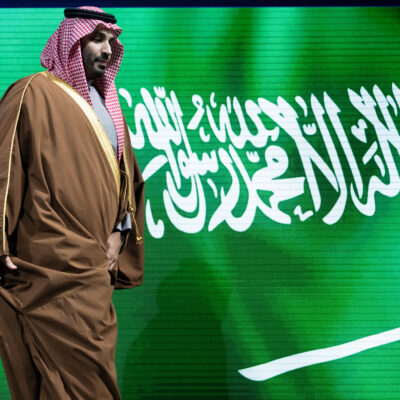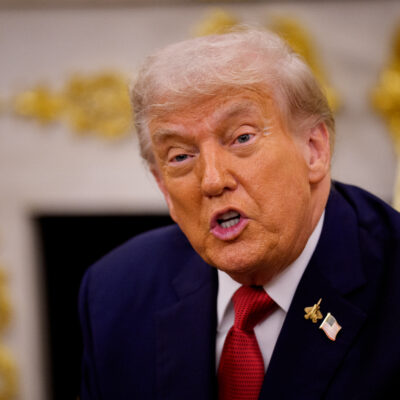
Christopher Furlong/Getty Images
American-born pope offers hope of improved Catholic-Jewish relations, religion experts say
Though he has almost no record on Jewish issues, Pope Leo XIV’s background in Chicago provides ‘a lot of reasons to be optimistic and even excited’ about interfaith cooperation
The election of Robert Francis Prevost as the first American pope on Thursday marked the beginning of a historic era for the Catholic Church, even as it also raised questions about the direction of Catholic-Jewish relations that had struggled under his predecessor.
Prevost, a 69-year-old Augustinian cardinal from Chicago who took the name Leo XIV, brings to his new role no known history of involvement with the Jewish community or record of commentary on key issues such as Israel and antisemitism, experts say.
Despite his apparent lack of engagement, Jewish leaders and scholars of Catholic-Jewish relations still expressed optimism that Prevost’s ascension could help to smooth lingering tensions with the Jewish community — which had risen during the reign of Pope Francis, who died last month at 88.
Francis, the first Latin American pope, had built bridges with the Jewish community early in his tenure, but in his final months angered many Jews who felt his harsh criticism of Israel’s military conduct in its war against Hamas in Gaza betrayed a blind spot with regard to a global rise of antisemitism as well as the security concerns of the world’s only Jewish state.
Prevost, for his part, could prove more instinctually sensitive to Jewish communal issues, according to Jewish community leaders following the papacy for signs of a possible thaw after Francis’ death. “I think the election of an American pope bodes well for the future of Catholic-Jewish relations,” Noam Marans, a rabbi and director of interreligious affairs for the American Jewish Committee, said in an interview with Jewish Insider on Thursday.
“He was educated in Chicago, where the advances of the post-Second Vatican Council and ‘Nostra Aetate’ and all that followed it were already part of the Catholic educational culture,” Marans added, referring to the 1965 Catholic declaration that denounced antisemitism while stating Jews could not be collectively blamed for the death of Jesus.
Prevost, Marans noted, also studied at the Catholic Theological Union in Chicago under John T. Pawlikowski, a formative leader in Catholic-Jewish relations who has described his former pupil as “a very open-minded person.”
“We know that that does not guarantee anything,” Marans acknowledged. “But it certainly puts us on the best foot forward.”
Ethan Schwartz, a Bible scholar who specializes in Catholic-Jewish relations at Villanova University, where Prevost graduated in 1977 with a bachelor’s degree in mathematics, echoed that assessment — noting that the new pope “grew up in in one of the major Jewish cultural capitals of the world” and is likely to draw on that experience while leading the Vatican.
“He doesn’t have much of a record to go on this,” Schwartz told JI. “But if you look at the broader situation, there are a lot of reasons to be optimistic and even excited about what this is going to mean for Jewish-Catholic relations.”
In contrast with the Argentine-born Francis, “the first post-World War II pope who didn’t really have a direct connection to the Holocaust,” Schwartz said that Prevost has a “direct connection to Jewish life” that could help inform his outreach.
“Now for the first time, we have a pope who is a product of a thriving Jewish community,” Schwartz said.
Of course, Prevost has long been far removed from that milieu, having served for two decades in Peru, where he became a naturalized citizen.
“Pope Leo XIV has spent most of his priesthood in Peru, where there is a small Jewish community of approximately 2,000 people, mainly in the capital Lima,” Edward Kessler, the founder of the Woolf Institute in Cambridge, England, and an expert on Catholic-Jewish relations, told JI. “He was bishop in Chiclayo, where there is not an organized Jewish community and does not seem to have commented on relations with Jews and Judaism.”
Most recently, Prevost had occupied a prominent perch at the Vatican, where he oversaw the office that selects bishops, a position he began in 2023.
In his first public address as pope on Thursday, Prevost stressed a message of peace and dialogue while speaking to the crowd gathered at St. Peter’s Basilica.
“Peace be with all of you,” he said, echoing Francis’ message of inclusion. “We must try together to be a missionary church,” he added, “a church that builds bridges and dialogue, always open, like this square, to receive with open arms everyone who needs our charity, our presence.”
The unanswered question, said Josh Stanton, a rabbi and associate vice president of interfaith and intergroup initiatives at the Jewish Federations of North America, “is who does he want to include in dialogue?”
“He is known for speaking quietly and acting meaningfully, so we will learn a great deal about Pope Leo XIV through his actions in the coming days,” Stanton said, while speculating that Prevost will welcome a diverse range of religious leaders to the Vatican and “engage in quiet diplomacy in areas where there is conflict, including the Middle East.”
Prevost’s election quickly drew a congratulatory statement from Israeli Prime Minister Benjamin Netanyahu on Thursday, after he notably waited several days to acknowledge the death of Francis.
Despite lingering tensions confronting the newly elected pope, the Chicago-born Prevost “is likely to understand Jewish people intuitively,” Stanton said.






